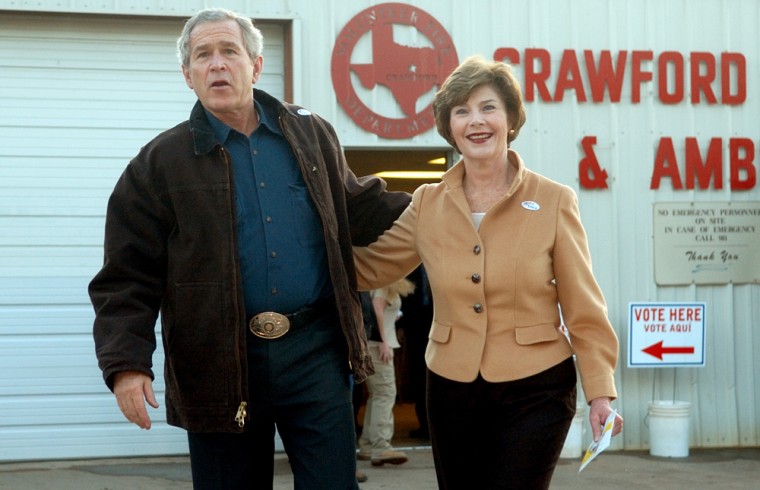President Bush, disappointed with the election results, will hold a news conference on Wednesday to urge his opponents to work with him, the White House said.
“The president’s not the kind of guy who is going to be somber about things,” said press secretary Tony Snow. But he added: “They have not gone the way he would have liked.”
Bush, unaccustomed to political defeat, planned a morning phone call to Democratic minority leader Nancy Pelosi and made plans to give his take on the midterm election results at a 1 p.m. ET news conference.
The president watched the results in the White House residence, where Snow described the mood as “businesslike.”
Asked if the president was surprised that the House appeared headed for Democratic control, Snow said it wasn’t “a slap-on-the-forehead kind of shock.”
President pushed hard
Determined to stave off a Democratic-controlled Congress, Bush raised millions of dollars, flew thousands of miles, shook hands, kissed babies, praised fellow Republicans and blasted Democrats — in private at first, lately before cheering crowds.
From huge hotel ballrooms in Washington to luxury homes across the country, Bush collected more than $193 million for the GOP at about 90 fundraisers over 20 months. Switching to traditional campaign rallies only at the last, he raced through 15 cities in 11 days.
Despite Republican fears and Democratic hopes that Election Day would place the House, the Senate and a majority of governors’ mansions in Democratic hands, Bush remained relentlessly optimistic.
“We’ve had quite a week,” he said in Texas. “We’re closing strong.”
Tuesday morning in his adopted hometown of Crawford, Bush cheerfully voted in the local firehouse. Outside, an “I voted” sticker on his jacket, he put aside the partisan attacks and appealed to Americans to vote, whichever party they favored.
Snow said the outcome of the elections was “not what we would’ve hoped.”
“But it also gets us to a point: Democrats have spent a lot of time complaining about what the president has done. This is an opportunity for them to kind of stand up,” Snow said.
“Now, one of the things is both parties have got a lot of work to do,” Snow said. “The president has got a very active agenda for the next two years and you’re going to need both parties. There has to be a calculated decision by the Democrats.”
Dinner with strategists
The president then returned to the White House to await the results so pivotal to the last two years of his presidency.
He was joined for dinner by political strategist Karl Rove, GOP chairman Ken Mehlman, White House chief of staff Josh Bolten, former Commerce Secretary Don Evans and Brad Freeman, a California venture capitalist and top Bush fundraiser.
A Capitol Hill even half dominated by Democrats would erect a bedeviling barrier to the remaining items on his presidential agenda. It would also raise the specter of possible investigations into his pre-Iraq war use of intelligence, post-Sept. 11 expansion of executive power and other issues.
From a famous family of politicians, Bush first entered the electoral fray on his own behalf in 1978 when he ran, and lost, for Congress from West Texas.
He has not lost since, not for governor of Texas in 1994 and again in 1998, not in two runs for the White House, and not in 2002, when — with his help — his party bucked historical trends and not only kept but expanded its majorities in the House and the Senate.
For this year’s midterm elections, Bush headlined at least as many political events as before the voting in 2002. But the nature of his effort was much different.
With the war growing unpopular and his approval ratings 25 points lower than four years ago, Bush kept his political appearances more out of the public eye.
When the public rallies did start, two months later than in the 2002 election cycle, they were exclusively in GOP-friendly states he won in 2004, most in small or rural communities less likely to have a boisterous anti-Bush presence.
He didn’t stay away from contested races. But by jetting into the reddest of states, such as Nebraska, Kansas and Montana, the president was playing defense. His assignment was not to lure undecideds, but to coax a dispirited GOP base to turn out.
White House political strategists said the president helped.
But some in Bush’s party made a point of distancing themselves from his policies, even while they eagerly accepted his behind-closed-doors fundraising help. Others said “No, thank you” to any presidential involvement.
